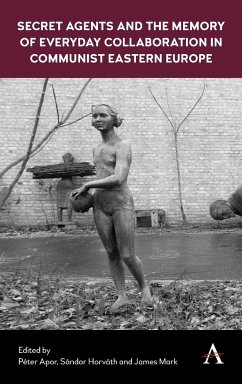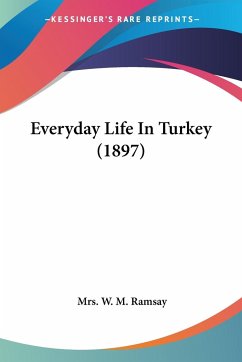Secret Agents and the Memory of Everyday Collaboration in Communist Eastern Europe
Herausgeber: Apor, Péter; Mark, James; Horváth, Sándor
Secret Agents and the Memory of Everyday Collaboration in Communist Eastern Europe
Herausgeber: Apor, Péter; Mark, James; Horváth, Sándor
- Gebundenes Buch
- Merkliste
- Auf die Merkliste
- Bewerten Bewerten
- Teilen
- Produkt teilen
- Produkterinnerung
- Produkterinnerung
'Secret Agents and the Memory of Everyday Collaboration in Communist Eastern Europe' examines the ways in which post-Communist societies have sought to make sense of Communist-era collaboration. It explores the motivations for becoming an agent and the moralities of this role, as well as the personal decisions and social consequences involved in this process.
Andere Kunden interessierten sich auch für
![The Collectivization of Agriculture in Communist Eastern Europe The Collectivization of Agriculture in Communist Eastern Europe]() The Collectivization of Agriculture in Communist Eastern Europe150,99 €
The Collectivization of Agriculture in Communist Eastern Europe150,99 €![The Everyday and Private Life of a Communist Ruling Class The Everyday and Private Life of a Communist Ruling Class]() György PéteriThe Everyday and Private Life of a Communist Ruling Class99,99 €
György PéteriThe Everyday and Private Life of a Communist Ruling Class99,99 €![Revising History in Communist Europe Revising History in Communist Europe]() David A. J. ReynoldsRevising History in Communist Europe133,99 €
David A. J. ReynoldsRevising History in Communist Europe133,99 €![Collaboration in Space and the Search for Peace on Earth Collaboration in Space and the Search for Peace on Earth]() Andrew L. JenksCollaboration in Space and the Search for Peace on Earth136,99 €
Andrew L. JenksCollaboration in Space and the Search for Peace on Earth136,99 €![The World's Greatest Military Spies and Secret Service Agents The World's Greatest Military Spies and Secret Service Agents]() George Barton AaronThe World's Greatest Military Spies and Secret Service Agents16,99 €
George Barton AaronThe World's Greatest Military Spies and Secret Service Agents16,99 €![Everyday Life In Turkey (1897) Everyday Life In Turkey (1897)]() W. M. RamsayEveryday Life In Turkey (1897)30,99 €
W. M. RamsayEveryday Life In Turkey (1897)30,99 €![The Collapse of Communist Power in Poland The Collapse of Communist Power in Poland]() Jacqueline HaydenThe Collapse of Communist Power in Poland62,99 €
Jacqueline HaydenThe Collapse of Communist Power in Poland62,99 €-
-
-
'Secret Agents and the Memory of Everyday Collaboration in Communist Eastern Europe' examines the ways in which post-Communist societies have sought to make sense of Communist-era collaboration. It explores the motivations for becoming an agent and the moralities of this role, as well as the personal decisions and social consequences involved in this process.
Produktdetails
- Produktdetails
- Verlag: Anthem Press
- Seitenzahl: 376
- Erscheinungstermin: 15. September 2017
- Englisch
- Abmessung: 235mm x 157mm x 27mm
- Gewicht: 760g
- ISBN-13: 9781783087235
- ISBN-10: 1783087234
- Artikelnr.: 50830589
- Herstellerkennzeichnung
- Libri GmbH
- Europaallee 1
- 36244 Bad Hersfeld
- gpsr@libri.de
- Verlag: Anthem Press
- Seitenzahl: 376
- Erscheinungstermin: 15. September 2017
- Englisch
- Abmessung: 235mm x 157mm x 27mm
- Gewicht: 760g
- ISBN-13: 9781783087235
- ISBN-10: 1783087234
- Artikelnr.: 50830589
- Herstellerkennzeichnung
- Libri GmbH
- Europaallee 1
- 36244 Bad Hersfeld
- gpsr@libri.de
Péter Apor (PhD), a permanent research fellow at the Institute of History, Research Centre for the Humanities, Hungarian Academy of Sciences, Budapest, Hungary, is a specialist in the social and cultural history of East-Central European countries after World War II. Sándor Horváth (PhD), a permanent research fellow and the head of department for Contemporary History at the Institute of History, Research Centre for the Humanities, Hungarian Academy of Sciences, Budapest, Hungary, is the founding editor of the Hungarian Historical Review. James Mark (PhD) is professor of history at the University of Exeter, United Kingdom.
Frameworks: Collaboration, Cooperation, Political Participation in the Communist Regimes By the editors; Part 1: Institutes; Chapter 1: A Dissident Legacy, The 'Federal Commissioner for the Stasi Records of the Former GDR' (BStU) in United Germany, Bernd Schaefer; Chapter 2: In Black and White? The Discourse on Polish Post-War Society by the Institute of Polish Remembrance, Barbara Klich-Kluczewska; Chapter 3: The Exempt Nation: Memory of Collaborationism in Contemporary Latvia, Leva Zake; Chapter 4: Institutes of Memory in the Slovak and Czech Republics - What Kind of Memory? Martin Kovani
; Chapter 5: Closing the Past - Opening the Future. Hungarian Victims and Perpetrators of the Communist Regime, Péter Apor and Sándor Horváth; Chapter 6: To Collaborate and to Punish. Democracy and Transitional Justice in Romania, Florin Abraham; Part 2: Secret Lives; Chapter 7: 'Resistance through Culture' or 'Connivance through Culture.' Difficulties of Interpretation; Nuances, Errors, and Manipulations, Gabriel Andreescu; Chapter 8: Intellectuals between Collaboration and Independence. Politics and Everyday Life in the Prague Faculty of Arts in Late Socialism, Mat
j Spurný; Chapter 9: Tito and Intellectuals - Collaboration and Support, 1945-1980, Josip Mihaljevi
; Chapter 10: Spy in the Underground. Polish Samizdat Stories, Pawe
Sowi
ski; Chapter 11: Entangled Stories. On the Meaning of Collaboration with the Former Securitate, Cristina Petrescu; Part 3: Collaborating Communities; Chapter 12: Finding the Ways (around). Regional-level Party Activists in Slovakia, Marína Zavacká; Chapter 13: 'But Who is the Party?' History and Historiography in the Hungarian Communist Party, Tamás Kende; Chapter 14: Forgetting 'Judas'. Priest Collaboration in Slovak Catholic Memory after 1989, Agáta Drelová; Chapter 15: Informing as Life-Style. Unofficial Collaborators of the Hungarian and the East-German State Security (Stasi) Working in the Tourism Sector, Krisztina Slachta.
; Chapter 5: Closing the Past - Opening the Future. Hungarian Victims and Perpetrators of the Communist Regime, Péter Apor and Sándor Horváth; Chapter 6: To Collaborate and to Punish. Democracy and Transitional Justice in Romania, Florin Abraham; Part 2: Secret Lives; Chapter 7: 'Resistance through Culture' or 'Connivance through Culture.' Difficulties of Interpretation; Nuances, Errors, and Manipulations, Gabriel Andreescu; Chapter 8: Intellectuals between Collaboration and Independence. Politics and Everyday Life in the Prague Faculty of Arts in Late Socialism, Mat
j Spurný; Chapter 9: Tito and Intellectuals - Collaboration and Support, 1945-1980, Josip Mihaljevi
; Chapter 10: Spy in the Underground. Polish Samizdat Stories, Pawe
Sowi
ski; Chapter 11: Entangled Stories. On the Meaning of Collaboration with the Former Securitate, Cristina Petrescu; Part 3: Collaborating Communities; Chapter 12: Finding the Ways (around). Regional-level Party Activists in Slovakia, Marína Zavacká; Chapter 13: 'But Who is the Party?' History and Historiography in the Hungarian Communist Party, Tamás Kende; Chapter 14: Forgetting 'Judas'. Priest Collaboration in Slovak Catholic Memory after 1989, Agáta Drelová; Chapter 15: Informing as Life-Style. Unofficial Collaborators of the Hungarian and the East-German State Security (Stasi) Working in the Tourism Sector, Krisztina Slachta.
Frameworks: Collaboration, Cooperation, Political Participation in the Communist Regimes By the editors; Part 1: Institutes; Chapter 1: A Dissident Legacy, The 'Federal Commissioner for the Stasi Records of the Former GDR' (BStU) in United Germany, Bernd Schaefer; Chapter 2: In Black and White? The Discourse on Polish Post-War Society by the Institute of Polish Remembrance, Barbara Klich-Kluczewska; Chapter 3: The Exempt Nation: Memory of Collaborationism in Contemporary Latvia, Leva Zake; Chapter 4: Institutes of Memory in the Slovak and Czech Republics - What Kind of Memory? Martin Kovani
; Chapter 5: Closing the Past - Opening the Future. Hungarian Victims and Perpetrators of the Communist Regime, Péter Apor and Sándor Horváth; Chapter 6: To Collaborate and to Punish. Democracy and Transitional Justice in Romania, Florin Abraham; Part 2: Secret Lives; Chapter 7: 'Resistance through Culture' or 'Connivance through Culture.' Difficulties of Interpretation; Nuances, Errors, and Manipulations, Gabriel Andreescu; Chapter 8: Intellectuals between Collaboration and Independence. Politics and Everyday Life in the Prague Faculty of Arts in Late Socialism, Mat
j Spurný; Chapter 9: Tito and Intellectuals - Collaboration and Support, 1945-1980, Josip Mihaljevi
; Chapter 10: Spy in the Underground. Polish Samizdat Stories, Pawe
Sowi
ski; Chapter 11: Entangled Stories. On the Meaning of Collaboration with the Former Securitate, Cristina Petrescu; Part 3: Collaborating Communities; Chapter 12: Finding the Ways (around). Regional-level Party Activists in Slovakia, Marína Zavacká; Chapter 13: 'But Who is the Party?' History and Historiography in the Hungarian Communist Party, Tamás Kende; Chapter 14: Forgetting 'Judas'. Priest Collaboration in Slovak Catholic Memory after 1989, Agáta Drelová; Chapter 15: Informing as Life-Style. Unofficial Collaborators of the Hungarian and the East-German State Security (Stasi) Working in the Tourism Sector, Krisztina Slachta.
; Chapter 5: Closing the Past - Opening the Future. Hungarian Victims and Perpetrators of the Communist Regime, Péter Apor and Sándor Horváth; Chapter 6: To Collaborate and to Punish. Democracy and Transitional Justice in Romania, Florin Abraham; Part 2: Secret Lives; Chapter 7: 'Resistance through Culture' or 'Connivance through Culture.' Difficulties of Interpretation; Nuances, Errors, and Manipulations, Gabriel Andreescu; Chapter 8: Intellectuals between Collaboration and Independence. Politics and Everyday Life in the Prague Faculty of Arts in Late Socialism, Mat
j Spurný; Chapter 9: Tito and Intellectuals - Collaboration and Support, 1945-1980, Josip Mihaljevi
; Chapter 10: Spy in the Underground. Polish Samizdat Stories, Pawe
Sowi
ski; Chapter 11: Entangled Stories. On the Meaning of Collaboration with the Former Securitate, Cristina Petrescu; Part 3: Collaborating Communities; Chapter 12: Finding the Ways (around). Regional-level Party Activists in Slovakia, Marína Zavacká; Chapter 13: 'But Who is the Party?' History and Historiography in the Hungarian Communist Party, Tamás Kende; Chapter 14: Forgetting 'Judas'. Priest Collaboration in Slovak Catholic Memory after 1989, Agáta Drelová; Chapter 15: Informing as Life-Style. Unofficial Collaborators of the Hungarian and the East-German State Security (Stasi) Working in the Tourism Sector, Krisztina Slachta.









